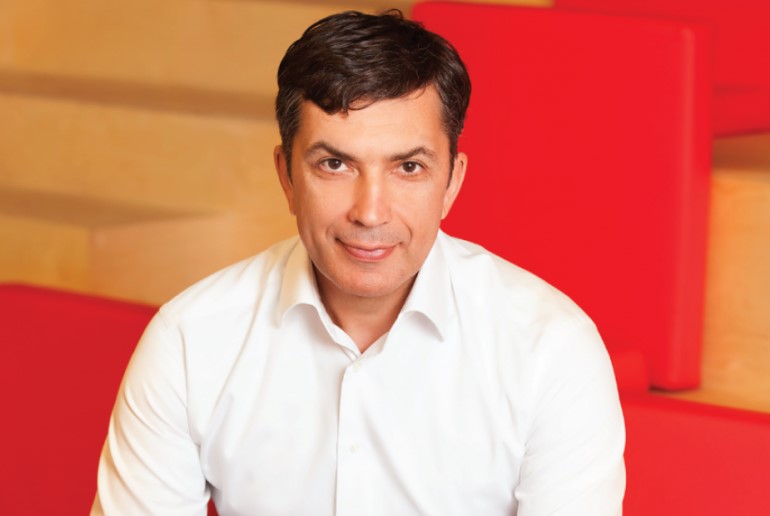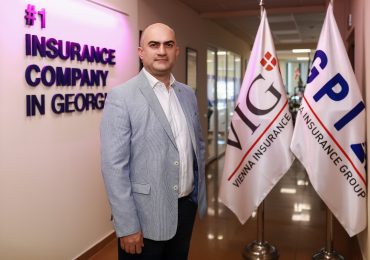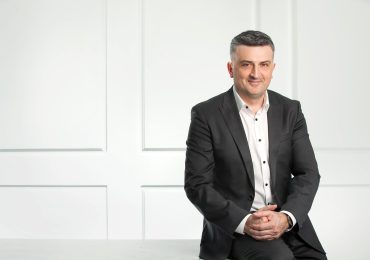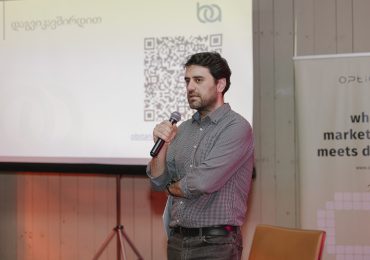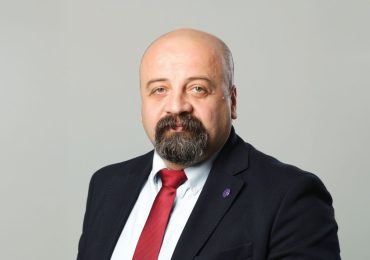General Manager of Philip Morris International in the Caucasus and Moldova, Yuriy Gordok, speaks about the company’s ambitious plans to offer Georgia’s 800,000 smokers scientifically approved alternative products.
The World Health Organisation has recently announced that the world is currently dealing with a smoking pandemic, calling on countries to be more proactive in reducing the number of smokers worldwide. According to official WHO data, approximately 31% of the adult population in Georgia are smokers. We must, therefore, ask how this problem can be resolved.
As strange as it may sound, there have been no significant changes in the use of tobacco for more than a century.The last major innovation to conventional cigarettes was the introduction of filters in the 1950s, which was designed to mitigate their harmful effects. Since then, we have witnessed improved marketing campaigns and increased health warnings, but product composition of ordinary cigarettes and consumption methods have essentially remained unchanged. At the same time, public awareness about the significant health risks associated with smoking has increased considerably.
Cigarettes are not only a mechanism for smokers to consume nicotine, but also to unwind and socialise – a habit that has been hardened by daily practice. People find it difficult to dispose of habits. Health warnings, higher prices, smoking restrictions in certain locations, and often even a smoker’s desire to quit are not enough for people to let go of cigarettes.
Let us begin by looking at the WHO figures, which show that there are currently 1.1 billion smokers across the world, and that this number is expected to remain largely unchanged until 2025.
A smoke-free future is a concept presented by one of the world’s largest tobacco manufacturers Philip Morris International (PMI). The company wants to offer more than a billion smokers a better choice in the shape of smoke-free products. PMI states that it is essential to bring about an end to the era of traditional cigarettes that still account for the bulk of the company’s revenues.
Why is Philip Morris International acting this way? Why is the company seeking to completely transform its business and create smoke-free products?
On closer examination, it becomes evident that an increasing number of public healthcare institutions, experts and governments are backing the development of alternative products that could potentially lower the health risks to smokers and the general public alike. The list of countries that have recognised the distinctive nature of smoke-free products and have adopted regulations to ensure that smokers have access to information and scientifically approved alternative products, includes the United States, the United Kingdom, Greece, Italy, Portugal and Bulgaria. Other countries, such as Norway and New Zealand, have expressed their willingness to take similar steps.
In July this year, the United States Food and Drug Administration (FDA) declared smoke-free products to be a good alternative for people who are struggling to quit smoking but wish to mitigate the harmful effects of their habit. FDA’s findings were preceded by several years of research.
PMI’s goal is to completely transform its business and thereby demonstrate the need for change to regulators across the world. The company has set itself an ambitious task of convincing at least 40 million people to switch from cigarettes to one of their alternative products within the next few years. PMI believes that with proper support from civil society and the appropriate regulations, the era of cigarettes could be brought to an end in many countries over the next 10-15 years. To speed up this process, the company has invested $7.2 billion in research for alternatives to cigarettes. Now armed with scientifically approved products, PMI is trying to transform one of the most heavily regulated sectors in the world.
The Journey to a Smoke-Free Georgia
The Current State of Play
In 2017, the Parliament of Georgia adopted the “Next Generation Tobacco Control Law” to free public spaces from smoking and to prohibit the promotion of smoking. Two years later, Georgian legislatures have already made some significant steps towards tobacco control laws and introduced a ‘heated tobacco category’ that fundamentally differs from combustible cigarettes.
Following regulatory developments, Philip Morris International decided to launch its smoke-free product to the Georgian market, and, at the end of July, IQOS– an alternative to smoking, was officially commercialized in Georgia for those adults who would otherwise continue smoking cigarettes.
Forbes Georgia, in an exclusive interview with Yuriy Gordok, General Manager of Caucasus and Moldova for Philip Morris International, discussed Georgia’s smoke-free journey – both the opportunities and the challenges.
- Yuriy, Thank you for your time. Let me start by asking: in your opinion how big is the problem of smoking today in Georgia?
- Gordok: In Georgia there are approximately 800,000 adult smokers. These hundreds of thousands of adult smokers aren’t just numbers. They might be our friends, family, or neighbours. Measures to deter people starting smoking and encourage cessation are fundamental. There is no disagreement about this. The best option is to quit tobacco and nicotine altogether or even better – not to start. But for the large population of existing adult smokers who’d otherwise continue smoking, there mustbe a sensible planthat moves them away from cigarettes.
Today, this solution exists. The vast majority of harmful compounds found in cigarette smoke and associated with smoking-related diseases are generated by combustion. Products that eliminate combustion, such as e-cigarettes and heated tobacco products, are a much better alternative to smoking.
- It is almost two months since Georgia joined the smoke-free world, tell us about this journey, how did Georgian consumers accept the product?
- Gordok: I’ve lived in Tbilisi more than a year and I’ve seen many Georgians who made their own decisions and switched from cigarettes to our product before IQOS was even available in the country. I’m incredibly happy that nowadays we can support these legal age users with a full customer service cycle.
I’m glad to share with you that currently in Georgia thousands of adult smokers have abandoned cigarettes and chosen a smoke-free alternative. We care about our customers as they deserve to receive accurate, non-misleading and science-based information about product alternatives to smoking, so they can make informed decisions.
We have a bold ambition: We want cigarettes to be replaced by science-based smoke-free products as soon as possible, to benefit people who smoke, those who care about them, and public health in general. At Philip Morris Georgia, we are happy that we have launched our smoke-free journey officially in Georgia, which will support the transition of adult smokers to healthier alternatives.
Since Georgia has about 800,000 adult smokers, what steps can be taken by the tobacco industry, as well by regulators, to reduce harms associated with cigarette consumption?
Gordok: While smoking is addictive and can cause serious diseases, it is estimated that more than a billion people will continue to smoke in the foreseeable future. Therefore, there is a real need for an alternative. While PMI’s commitment to a smoke-free future is unwavering, and we have robust science on our side, we cannot make this journey alone. I’m confident that the right mix of government leadership and commercial initiative will dramatically accelerate efforts to reduce the health burden of smoking. The latest international survey from PMI showed that the public wants greater focus on science-based decision making. When reliable scientific information is in short supply, misinformation, wild guesses, and hearsay are rife; this significantly hampers people’s ability to make informed decisions.
- IQOS commercialization to the Georgian market almost coincided exactly with the decision from the US Food and Drug Administration (FDA) that gives your product a new status of modified risk tobacco product. Can you tell us more about this decision and its significance to your goal of transforming the market with smoke-free products?
- Gordok: The US. Food and Drug Administration’s decision is a historic public health milestone. It marks the first time that the FDA has granted MRTP (Modified Risk Tobacco Product) marketing orders for an innovative electronic alternative to cigarettes. The decision demonstrates, that IQOS is fundamentally different from cigarettes, as it “heats tobacco, but does not burn it”. After having reviewed the totality of scientific evidence available on IQOS, the FDA has concluded that switching completely from cigarettes to IQOS reduces your body’s exposure to harmful or potentially harmful chemicals. Now is the time to rapidly shift adult smokers away from cigarettes. Scientifically substantiated better alternatives, like IQOS, represent a public health opportunity.
On-going monitoring, studies and reporting will allow FDA to ensure maximization of opportunity for men and women who smoke and minimization of unintended consequences. It will also allow collection of long-term evidence to add to the already strong evidence base. The government of Georgia could follow this science-based approach in their policymaking.
- PMI has announced its goal to help at least 40 million adult smokers worldwide to switch to smoke-free products by 2025. What progress do you want to achieve with smoke-free products in the upcoming years on Georgian market?
- Gordok: Philip Morris Georgia will continue its smoke-free journey in Georgia to replace cigarettes with smoke-free alternatives as quickly as possible. Thousands of men and women who smoke cigarettes are looking for less harmful alternatives. We will give them this choice, as we believe that new, potentially less harmful products are a better alternative for adult smokers. But we can only achieve a significant public health benefit when many people are aware of smoke-free products and switch to them. How can you explain a new product in detail – so that consumers fully understand and make an informed decision – if you can’t talk to them directly? Here the role of regulators is of paramount importance.
Governments and public health authorities have a critical role to play in providing clear and accurate information to consumers about this new category of products and defining the regulatory framework that can accelerate large-scale switching. Experts have the responsibility to provide accurate information on the science they develop and review. Ultimately, adult smokers need to embrace the opportunity offered by better alternatives and switch to them of their own volition.
- How would you assess the regulatory and business environment in Georgia, especially from the standpoint of an international company that has been operating in the country for more than twenty years?
- Gordok: Georgia has made significant steps towards tobacco control law, however,there are still number of gapsthat need to be addressed and discussed for the benefit of public health. It’s equally clear that thousands of Georgian adults will continue to smoke and that these people should have the opportunity to switch to better alternatives. An adequate regulatory framework can help accelerate this, by allowing consumers to receive information about new products while strictly prohibiting false or misleading statements.
Those who are still in opposition should be aware that they are becoming disablers of public health solutions. They are blocking change, potentially denying adult smokers both access to accurate information on these smoke-free alternatives, and the opportunity to switch to them if they do not quit. This is a real opportunity. We must seize it and seize it together. It’s time to have an open, science-based dialogue to make a smoke-free future a reality.
Philip Morris Georgia is one of the top taxpayers in Georgia. For the last several years the excise tax on tobacco products has increased, in your opinion how should e-cigarettes and other potentially safer alternatives to cigarettes be taxed?
Gordok: Regulations should continue to dissuade people from starting to smoke and encourage cessation. They should be risk-proportionate and follow a common sense approach: The most harmful product, cigarettes, should be subject to the most restrictive regulations. This would encourage companies to invest in continuous innovation and scientific research while encouraging adult smokers to switch.
- That just sounds like you are asking to be taxed less…
- Gordok: Not at all! It is common sense that many experts support –more harmful products should be taxed more than less harmful ones, so that manufacturers are incentivized to invest in better alternatives and consumers are incentivised to switch to these alternatives as well.We endorse regulatory and fiscal policies that enable and promote a switch from combustible tobacco products to less harmful alternatives. It is critical to implement a tax framework that is practicable, efficient and encourages innovations and investments that serve public health by achieving consumer switching to reduced risk alternatives.
- How challenging was investing and introducing a new product on Georgian market duringtheCOVID-19 pandemic and how much did you invest in this project?
- Gordok: Philip Morris International has transformed its entire business to focus on the consumer and develop scientifically substantiated better alternatives for those adults who would otherwise continue smoking.
To date, our holding company PMI has invested $7.2 billion into the research and development of our smoke-free products. We, at PMI, believe in technology and science and have worked hard to commercialize less harmful alternatives to cigarettes to the Georgian market.
We have been operating in Georgia more than twenty years, as an active business community member, we care about Georgia’s economic environment. Launching IQOS in the Georgian market brings benefits to the Georgian economy, as the initiative includes creating hundreds of new jobs and significant investment in infrastructure.
- As new technologies and new alternatives emerge what should be the role of Georgian regulators to achieve a smoke-free future?
- Gordok: We are fully committed to replacing cigarettes with science-based less harmful alternatives as rapidly as is feasible. We are shifting our organization to this end and making tremendous progress. We have never been so close to this opportunity. However, we cannot make this journey a successful one alone. In pursuing a vision of a smoke-free future, we are eager to see measures introduced that drive large-scale switching as quickly as possible. Accurately communicating scientific information should remain an important priority. Comprehensive science-based regulation can help to rapidly shift adult smokers – who would otherwise continue smoking – to better options, while simultaneously guarding against any unintended consequences.
About Philip Morris Georgia – The company is a major taxpayer in Georgia, having operated in the country for more than twenty years. The 2020 Forbes Georgia Index ranks Philip Morris Georgia 26th among the largest private businesses operating in the country.
Yuri Gordok
- Years of experience working in the Philip Morris International executive team. Head of the company’s Caucasus and Moldova business division since 2019;
- Has lived in four countries (Kazakhstan, Russia, Switzerland, and Georgia) whilst working for PMI.
"Forbes Georgia-ის სარედაქციო ბლოგპოსტების სერია "როგორ გამდიდრდა“ და "საქართველო რეიტინგებში".
